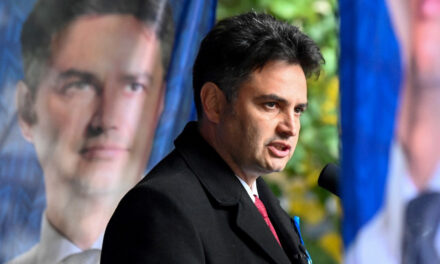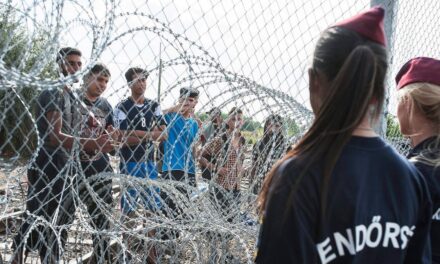I never thought that one day I would have to turn to the Indian media if I wanted to receive authentic information about the Russian-Ukrainian war in English, writes Gyula Hegyi, a former member of the European Parliament, in his opinion article.
As a noble tradition of liberalism, we have often heard the saying attributed to Voltaire, according to which even death must be accepted so that those who hold views that are contrary to ours can express their opinion. In such an extreme form, this is of course only a token gesture to respect freedom of opinion, but it is a fact that in Western democracies freedom of press and opinion basically existed.
After the outbreak of the war in Ukraine, the leaders of the European Union kicked it up a notch by banning all Russian news channels and information sources. Perhaps it was not so much the fact of the ban that was surprising, but the fact that
how naturally the intellectuals, who were thought to be liberal yesterday, accept censorship. However, if a power gets used to censorship, it is difficult to give it up voluntarily later.
According to the first justifications, Russian propaganda had to be banned in order not to disturb correct and authentic Western information. But it soon became clear that Western (mainly British) propaganda gave a completely false picture of the war.
Every day for fifteen months, he has been announcing Russia's economic and military collapse, running out of ammunition, Putin's cancer, his death, the appearance of his doppelgangers, and similar fake news. So-called analyzes lack exactly what makes an analysis an analysis: an objective presentation of the causes and facts. One of the most important geopolitical changes of our time, the military alliance of the nuclear power with the largest area and largest population in the world, and its long-term consequences, are essentially being lied to the public.
I myself have been reading English since I was fourteen years old, and my articles have also appeared in British newspapers. I never thought that one day I would have to turn to the Indian media if I wanted to get authentic information about the Russian-Ukrainian war in English.
The rejection of collective punishment was a noble Western value, which was especially appreciated by those who experienced the torture of entire ethnic groups and social strata in Eastern Europe. In comparison, the ruthlessness with which Western leaders would ban all Russian and Belarusian athletes from the Olympics, even without using their flag and anthem, is depressing. It is particularly thought-provoking that, in contrast to the West, the countries of the so-called global South stand for the supremacy of sport over politics, the spirit of peace and fair competition. Many people will remember this even after the war. Banning Belarusian athletes is also stupid from the West's point of view. The country did not enter the war, and if Belarusian athletes could compete under more favorable conditions than the Russians, it would psychologically strengthen the sense of independence of the Belarusian society.
Among other reasons, the West owed its success to the fact that, in contrast to dictatorships, it did not subordinate its economy to ideological slogans and paper-flavored theories
Before last February
we hardly thought that instead of cheap and moderately polluting energy, we would have to switch to more expensive and Photo: more burdensome energy for ideological reasons.
The European Union is of course rich enough, but even we, blinded by the red fog of war, cannot overwrite the basic laws of the economy in the long term. Especially not when our great ally, the USA, and our great rivals, India and China, are both profiting heavily from the Brussels sanctions tsunami.
The freedom of travel and the continuous growth of civil air traffic were among the sympathetic achievements of the West. Even during the decades of the Cold War, Eastern and Western airlines regularly traveled between Moscow and London, Budapest and Paris. Tourism, cultural and sports relations, and the gradually expanding freedom of travel also contributed to the fall of Eastern European dictatorships.
Solidarity with Ukraine should be expressed by the closure of non-continental airspace for almost a year and a half and by the obstruction of civil air traffic.
In addition, as a bonus, we pass on the benefits of freedom of flight to countries that we do not consider to be champions of freedom anyway.
And yes, peace
The strength of the West has always included the ability to negotiate, agree, and consider mutual interests. This helped him out of those conflicts when, giving up the ration, he himself temporarily slipped into ideological adventures or wars of conquest. Today, all that has changed tragically. Seven billion of our earth's eight billion inhabitants live in countries whose leaders and public opinion either demand immediate peace on the Russian-Ukrainian front, or are not even interested in war.
Slowly, there is no longer a major Asian, African or Latin American country that has not come up with a peace plan or mediation proposal, not to mention the Vatican, Turkey and Israel. The leaders of the European Union and the United States brush off these initiatives as if they were humble petitions from colonial tribes. Western leaders fly back and forth between the capitals of the so-called Global South and threaten more and more nations with sanctions because they still want to remain neutral based on their decades-old non-aligned traditions.
After the failure of the Vietnam War, the West realized that in order for its principles to be accepted, it was necessary to win the "hearts and minds" of the countries it wanted to influence. Today's brigade, the Blinkens, Borrells, Baerbocks, to mention only the B's, have forgotten just that.
Everywhere they threaten sanctions, demand and educate, without caring about the feelings and traditions of their hosts.
They do not achieve results anywhere, but in more and more places the belief is being strengthened that the strengthening of a Moscow-Beijing center would be very useful for non-Western countries. I don't think so, but it doesn't matter. The European Union, which for a long time wanted to win the hearts and minds of the former Third World with humanitarian and environmental actions, aid programs and polite gestures, is now trying to get these countries to line up behind it as an angry war bloc. Moreover
most sanctions, bans, and censorship do not significantly affect the situation at the front, they harm us more than they benefit the Ukrainians.
Every day this war policy destroys something of what was good in the West, for which we loved and want to continue to love.
Featured Image: Pixabay













